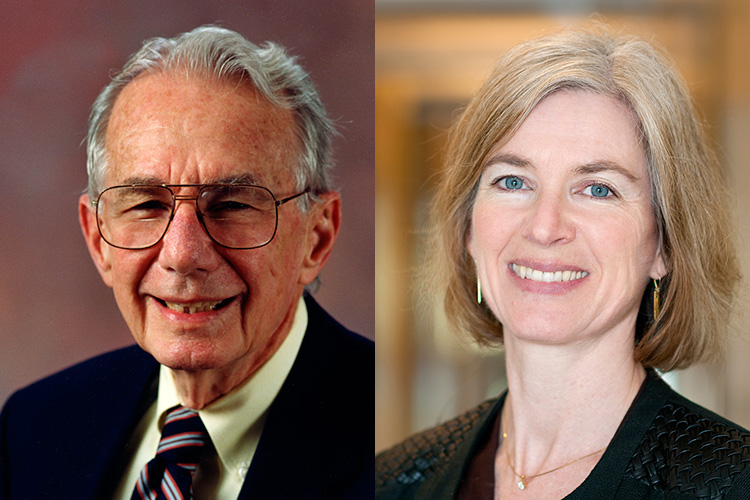Taiwan’s Tang Prizes awarded to Doudna, Rosenfeld
Taiwan’s top science award, the Tang Prize, has gone to two UC Berkeley scientists well-known in the fields of biochemistry and physics: Jennifer Doudna, for her invention of CRISPR-Cas9 gene editing, and Arthur Rosenfeld, often called the “godfather of energy efficiency.”

The awards, announced over the weekend in Taipei by Nobel laureate Y. T. Lee, himself a UC Berkeley professor emeritus of chemistry and former head of Taiwan’s Academia Sinica, each come with a cash prize of $1.24 million, in addition to funds for research.
Lee announced the 2016 Tang Prize in Sustainable Developmenton June 18, hailing Rosenfeld “for his lifelong and pioneering innovations in energy efficiency resulting in immense reductions in energy consumption and greenhouse gas emissions around the world.” He is a professor emeritus of physics and a distinguished scientist emeritus at Lawrence Berkeley National Laboratory.
The 2016 Tang Prize in Biopharmaceutical Science was announced June 19, and will be split among Doudna, a professor of molecular and cell biology and of chemistry, and her collaborator, Emmanuelle Charpentier of the Max Planck Institute of Infection Biology in Germany and Umeå University in Sweden, as well as Feng Zhang of the Massachusetts Institute of Technology. They were honored “for the development of CRISPR/Cas9 as a breakthrough genome editing platform that promises to revolutionize biomedical research and disease treatment.”
Doudna, a Howard Hughes Medical Institute investigator and the Li Ka Shing Chancellor’s Chair in Biomedical and Health Sciences, is also a faculty scientist at Berkeley Lab.
A third Tang Prize in Sinology was announced today, while the fourth, for Rule of Law, will be announced tomorrow. Recipients in all fields will receive a medal, diploma and cash prize at the award ceremony on Sept. 25 in Taipei.
Rosenfeld, a particle physicist, founded the Center for Building Science at Berkeley Lab, which has had a lasting effect on the nation’s energy use. The group developed the high-frequency electronic ballasts that made compact fluorescent light bulbs possible, coated windows to block heat from the sun and computer programs for building energy analysis and design.
As senior adviser to the U.S. Energy Department’s assistant secretary for energy efficiency and renewable energy from 1994 to 1999, and later as California’s energy commissioner from 2000 to 2010, he helped pass energy standards for “energy vampires,” which are appliances, such as TVs and computer monitors, that use energy even when they are in “sleep” mode. In recent years, Rosenfeld promoted the widespread use of “white roofs” and “white pavement,” which reflect thermal radiation back into the atmosphere rather than absorbing it.
Doudna and Charpentier took a gene-editing system originally developed by bacteria and streamlined it to work in other organisms to cleanly cut DNA. Zhang reported the first successful adaptation of Cas9-based genome editing in mammalian and human cells.
The possibilities for genetic editing are immense, Lee said, from drug testing and trials to inheritable disease prevention to agriculture. The prize committee noted that CRISPR-Cas9 gene editing is not a replacement for nature, and that human beings will still need to respect the delicate balance of ecological and sociological systems. “Alongside the ability to edit our genes, social equality must be respected,” Lee argued.
The Tang Prizes, awarded every two years, were named in homage to the Tang Dynasty, which was known for its cosmopolitanism. Founded in 2012 by Samuel Yin, the prizes are given based on “the originality of their work along with their contributions to society, irrespective of nationality, ethnicity, gender and political affiliation.” The prizes are administered by the Academia Sinica, the foremost academic research institute in Taiwan.
One of the two winners of the 2014 Tang Prize in Biopharmaceutical Science was James Allison, a former UC Berkeley researcher whose campus work led to the resurgence of immunotherapy against cancer.
